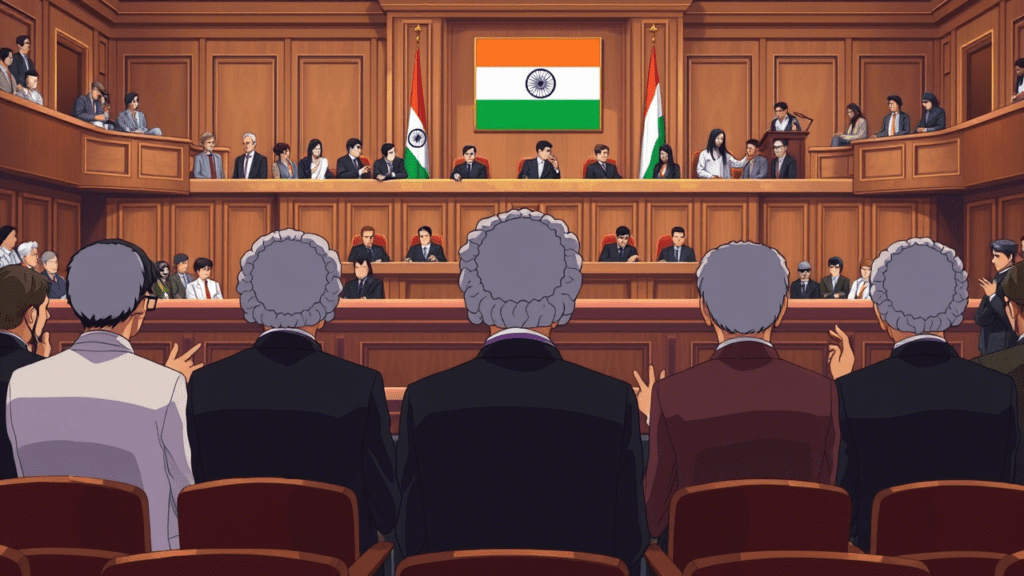
The appointment of Justice Arun Palli as the Chief Justice of the Jammu and Kashmir and Ladakh High Court has been a significant development in the Indian judiciary. This decision, taken by the President of India, follows the recommendation of the Supreme Court Collegium earlier this month. The appointment highlights the importance of judicial leadership in maintaining the rule of law and ensuring justice for all citizens, especially in sensitive regions like Jammu and Kashmir and Ladakh.
In this article, we will delve into the details of this appointment, analyze its implications, and provide some static general knowledge (GK) facts that are crucial for aspirants preparing for competitive exams. Let us explore this topic in a simple and easy-to-understand manner.
Table of Contents
Who is Justice Arun Palli?
Justice Arun Palli is a senior judge who was serving on the Punjab and Haryana High Court before his elevation to the position of Chief Justice of the Jammu and Kashmir and Ladakh High Court. His appointment underscores his reputation as a fair and competent jurist. Throughout his career, Justice Palli has handled numerous complex cases, earning respect from both legal professionals and the public.
Justice Palli’s transfer to the Jammu and Kashmir and Ladakh High Court is significant because these regions have unique socio-political dynamics. His experience and expertise are expected to play a vital role in addressing the legal challenges faced by the people of these areas.
The Appointment Process
The process of appointing judges to high courts and the Supreme Court of India involves several steps. Here’s a brief overview:
- Role of the Supreme Court Collegium : The Collegium, comprising the Chief Justice of India and four senior-most judges of the Supreme Court, recommends names for judicial appointments. In this case, the Collegium recommended Justice Arun Palli for the position of Chief Justice of the Jammu and Kashmir and Ladakh High Court.
- Approval by the President : After receiving the Collegium’s recommendation, the President of India formally approves the appointment. This step ensures that the judiciary remains independent while adhering to constitutional procedures.
- Significance of the Appointment : The appointment of a new Chief Justice is always important because it reflects the government’s trust in the individual’s ability to uphold justice impartially. For Jammu and Kashmir and Ladakh, which have historically faced political instability and security concerns, having a strong judicial leader is even more critical.
Why is This Appointment Important?
The Jammu and Kashmir and Ladakh High Court serves a population living in diverse cultural, religious, and geographical settings. The region has witnessed decades of conflict, leading to numerous legal disputes related to land, property, human rights, and governance. Justice Arun Palli’s appointment comes at a time when there is an urgent need to address these issues effectively.
Key Challenges Facing the Region
- Post-Abrogation Legal Issues : Since the abrogation of Article 370 in August 2019, many legal questions have arisen regarding the status of laws, properties, and citizenship in Jammu and Kashmir. Justice Palli’s tenure may involve resolving such contentious matters.
- Developmental Disputes : With increased focus on infrastructure projects in Ladakh and Jammu and Kashmir, disputes over land acquisition and environmental protection are likely to arise. A proactive judiciary can ensure that development does not come at the cost of local communities or ecosystems.
- Access to Justice : Many remote areas in Jammu and Kashmir and Ladakh lack adequate access to courts and legal aid. Improving accessibility to justice will be one of the key priorities for the new Chief Justice.
Static GK Facts Related to the Topic
For students preparing for competitive exams, here are some important static GK facts related to this appointment and the regions involved:
- Punjab and Haryana High Court :
- Established: 1955
- Current Chief Justice: Sheel Nagu
- Jammu and Kashmir and Ladakh High Court :
- Established: 1928 (originally as the Jammu and Kashmir High Court)
- Headquarters: Srinagar (summer) and Jammu (winter)
- Political Leadership in Jammu and Kashmir :
- Chief Minister: Omar Abdullah (as of now)
- Lieutenant Governor: Manoj Sinha
- Ladakh Administration :
- Lieutenant Governor: B.D. Mishra
- Supreme Court Collegium :
- Comprises the Chief Justice of India and four senior-most judges of the Supreme Court.
- Responsible for recommending appointments and transfers of judges.
- Article 370 :
- Abrogated on August 5, 2019.
- Granted special status to Jammu and Kashmir until its revocation.
These facts are essential for aspirants preparing for UPSC, SSC, banking exams, and other competitive examinations.
The appointment of Justice Arun Palli as the Chief Justice of the Jammu and Kashmir and Ladakh High Court marks a new chapter in the region’s judicial history. His extensive experience and commitment to justice make him well-suited for this challenging role. Aspirants preparing for competitive exams should take note of this development, along with the associated static GK facts, as they are highly relevant for current affairs sections.
By understanding the significance of such appointments and their implications, candidates can gain valuable insights into India’s judicial system and its role in nation-building. We hope this article helps you prepare better for your exams while staying informed about important national developments.
For more articles like this, keep visiting RankersChoice.com!
